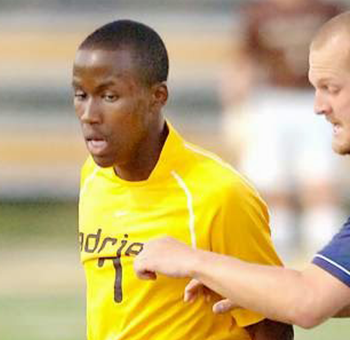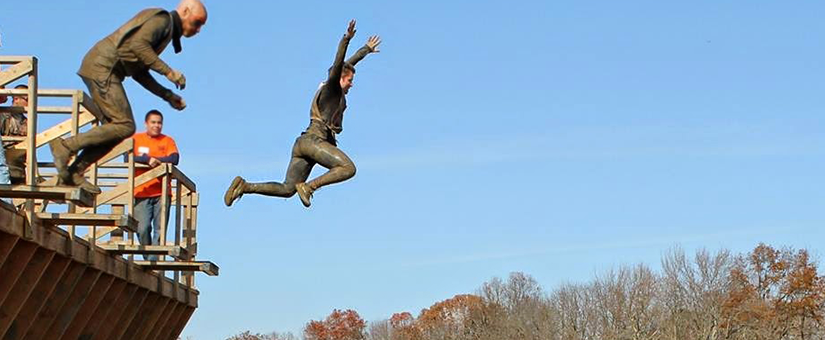
A Former D1 Soccer Player Conquers the Challenges of Muay Thai and the 24-Hour Tough Mudder with Mental Toughness
The Value of Mental Skills Training in Collegiate Soccer (Part 3 of 3)
Part 3: Heather Clapacs
In this three part series we take a look at how three former collegiate student-athletes benefitted from a structured mental skills training program in their sport performance, injury rehabilitation, and life.
In Part 3 of this series we talked with Heather Clapacs, a multiple time all-league award winning former D1 college soccer player, about how incorporating the mental skills training she learned on the field during her collegiate career helped fuel her drive to become an undefeated Muay Thai fighter as well as a 24-Hour Tough Mudder competitor.
Heather Clapacs
NCAA D1 Soccer player 04-07
D1 Assistant Soccer Coach 08, 13
Masters Degree in Exercise Science
Certified Performance Specialist
Competed in Muay Thai kickboxing from 2010-2013. 4-0 record
Competed in worlds Toughest Mudder: 24 hour mental, endurance and strength event.
Completed 10 laps/50miles/188 obstacles
Travels around the country competing on Tough Mudders (10-12 mile obstacle course with 20-25 obstacles)
Derrek Falor (DF) – Tell us a little about yourself as a collegiate soccer player.
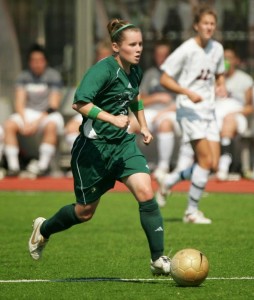
Heather Clapacs (HC) – I was always a very skillful player, fast, dynamic and could see the field better than your average soccer player. I was also very hot headed and had a horrible temper. I was very hard on myself. I think I looked at sport this way partly because I didn’t want to disappoint my dad. I am the oldest of three girls in my family, we are all athletic and that derives from my parents. Both my mom and dad were athletes growing up, Dad played semi pro Hockey and my mom played basketball and softball in high school. Being an athlete was a huge part of growing up; our lives revolved around sports.
DF – What were some of your influences that helped you to become consistent as a player?
HC – My parents are both very supportive, always encouraged us and really built our confidence up from a young age. I always felt like I could conquer anything that I wanted to. I can remember being 7 or 8 years old playing rec soccer with the boys and thinking “I can take you, I can take all of you”, and I did really well. I think having strong mental confidence allows you to put consistent performances on the field day after day and accomplish everything you want to. I can honestly say that the reason I was so successful in high school and college was because I was mentally strong.
DF – There are some basic principles of sport psychology and mental toughness training (9 Mental Skills of Successful Athlete; Jack Lesyk, Ohio Center for Sport Psychology) that you learned as a college soccer player. Can you tell us which of those skills you found most helpful across all three of your sports?
HC – I always focused on maintaining a high level of self-motivation day in and day out. I constantly use positive self-talk. Although early in my career my self-talk wasn’t always positive! For me another critical issue was, and is, to always maintain your concentration on the skill that you have to in that moment. And lastly I have always chosen to maintain a positive attitude in training and games no matter what.
DF – You have a quote that you like to refer to a lot, don’t you?
HC – “I always felt that my greatest asset was not my physical ability, it was my mental ability” – ~Bruce Jenner. For me this sums up what should make an athlete tick. You may not be the best or most skilled but you can make up for some of the things you might lack physically with a strong mental game.
DF – You were technically very clean and precise as a player. You clearly put in the thousands of hours needed to become proficient technically and tactically in soccer. But what other ingredients helped you to become a multiple time All-League honoree and three year team captain?
HC – Being mentally tough plays a significant role in what makes a great athlete, at least in my view. I grew up in a mentally strong household, where my parents gave me the support and confidence to become anything I wanted to be. Whether that be a collegiate soccer player, Muay Thai kickboxer or World’s Toughest Mudder contender. I guess the thing that maybe most defined me as a player is that I never allowed myself to stop or give in.
DF – What role did self-talk have for you on the field?
HC – I used self-talk a lot to calm myself down and to motivate myself when the games got rough, close, or we were in overtimes. For example after I scuffed a pass or a shot I would always say “unlucky” or “next time”, just to make sure I didn’t fly off the handle like in my earlier years. I usually played the full 90 min, so towards the end when it was crunch time I would have to keep myself going through self-talk. I would use phrases like “let’s go X amount of minutes left”, “you got this, power through”, “keep your legs moving”. While these were simple phrases, they kept me going.
DF – Tell us how you responded to mistakes early in your soccer career.
HC – I was mentally strong and confident 80-90% of the time as a freshman. However, like I said before, I had a bad temper and was very hard on myself. It got worse when I played in college, because I became even more self-critical. When I played a ball that didn’t quite make it to where I wanted it to go, or I sky rocketed a ball over the net, I would lose my mental focus and take myself out of the next few plays, throwing my hands up and cussing at myself. I took myself out of the game, mentally for the next 1-2 plays. I remember taking shots after I had made a mistake and I would just be so angry at myself that I literally remember trying to blast the ball through the back of the net instead of placing it. Usually meant I missed the goal by a lot! Took me a while and a bunch of talks with my coach to stop playing so angry after mistakes.
DF – So clearly, anger isn’t the best response! What kind of changes did you make in responding to mistakes as you became an upperclassman?
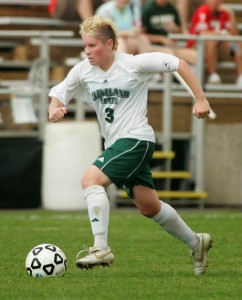
HC – My college coach suggested some different techniques to help remedy the problem, so that I wouldn’t take myself out of the game mentally. Identifying your weakness and applying them mentally will only make you mentally more sound. I also realized that as a key player, my team needed me to control my temper and be in the game 100% of the time. So I would first recognize the exact nature of the mistake, you know; bad first touch, missed a header, bad pass. Then it was easier for me to focus my effort on fixing the problem rather than just playing pissed off.
DF – Any other things your coach suggested to help you to deal with mistakes?
HC– He also helped me work on using visualization. He thought it would help me to visualize the field, completing the pass, scoring the goal, making the right chip. It did help and it also helped me to visualize making a mistake and dealing with it. We also used a rubber-band around my wrist and when I would make a mistake, I would snap it and move on. Rather than my typical rant.
DF – How did maintaining a positive attitude help you work through challenges on the field when your team wasn’t winning?
HC – Maintaining a positive attitude helped me not become angry that the game wasn’t going my way. As soon as you let negativity take over your emotional and mental state then you are fighting a losing battle. Then the fact that you are losing begins to frustrate you even more. I still live by this today. You can’t let anger and frustration take over in any situation, because then you turn to negativity and that gets you exactly nowhere.
DF – One of the things that always stood out about you as a player was that you would project this air of confidence no matter what.
HC – Yeah, I did always feel like I was going to have the most impact on the outcome of the game. I played center mid and stood at 5”2” weighing maybe 125 pounds. As you can imagine I was usually the smallest player on the field, however I had the biggest physical presence. No one was going to beat me to a ball, win an air ball or get past me. I had too much determination and pride to let that happen. I think my confidence went along with having a positive attitude and knowing I could conquer anything I wanted to. I knew I could get it done because I trained hard and told myself that I could always find a way.
DF – Did you do anything specific to build that confidence on days when you weren’t feeling your best?
HC – I would remember my favorite plays. Whether it be scoring the game winning header off a corner kick, or cutting through 2-3 players to make that perfect pass for the assist. I would pump myself back up with memories of the rewarding or awesome things I had done in the past that made me feel confident.
DF – In the last year of your playing career you took responding to mistakes to a whole new level; your response to your own mistake or a teammates was often to respond with renewed effort, rather than pout. What drove you to take that approach?
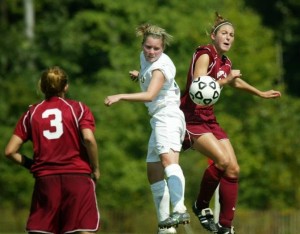
HC – On the occasion that I would play a crappy ball or lose the ball, I was the first person to sprint after it and win it back. In my mind, if you lose the ball or cause the turn over, you better be the first person working your butt off to get it back. That was my thought process with my whole team, as a leader I had to set the example. I didn’t care if I lost the ball in the final third and had to sprint back to the defensive third to get it back, I did it anyways. I also have too much pride to let someone take something from me and not fight for it back.
DF – You were always able to push through pain and fatigue barriers that your peers couldn’t. How were you able to persevere when most players hit the proverbial wall?
HC – I had a mental drive that would allow my body to keep going even when my legs wanted to shut down. I would cramp so bad in my calves and hamstrings during games that I had to drink pickle juice and Pedialyte after games! But mentally I told myself to keep going, and I would. I know that sounds simple but I knew that the battle of fatigue was in my head and I could control that. Your body is always going to want to give up, your mind is the only thing that will allow that not to happen. If you can mentally tell yourself to keep going you will. That “physical wall” you think you hit, is actually a mental wall, bust through it and keep going like you have no other option.
DF – For most athletes that incredibly hard because we don’t like to be that uncomfortable, but tell me what mental skills tool you would use to accomplish that? How was your ‘mental drive’, as you put it, so strong?
HC – Giving up and shutting down was just not an option to me. In my mind I had to figure out how to keep going because if I quit, even once, it would be easier to quit next time. I always go back to the fact that I have too much determination and pride to let a weakness shut me down. I would say self-motivation played a huge roll in this. I thought that if I quit I would stop getting better.
DF – What were some of the motivating factors that helped you stay sharp game in a game out even on teams that struggled to win at times?
HC – Being a starting center mid or play maker at the D1 level, if you will, is a huge role to play on a collegiate team. I knew that if I had a good game, my team would most likely have a good game. So mentally that’s the way I thought. ‘It was all up to me.’ Even when we were playing terrible, I kept things as positive as I could, because I knew if I broke down it would only get worse. There were games that we would be trailing by more than I care to remember, but I never broke my mental toughness. Until that whistle blew at the 90thminute I continued to work, giving up was never an option. If you gave up then not only did your opponent beat you physically, but then you also beat yourself mentally as well. You lose confidence pretty quick when you beat yourself.
DF – What do you do now to keep driving forward now as a Tough Mudder competitor when you don’t have a team as your motivating or focal point?
HC – I have always been really good at motivating myself and I think it’s because I demand my best effort at all times, anything less just isn’t good enough. I know when I haven’t given my best effort I will feel terrible the next day, although it’s rare, I hate that feeling. I remember how satisfying it feels to have given 100% versus 90% or less and that keeps me going.
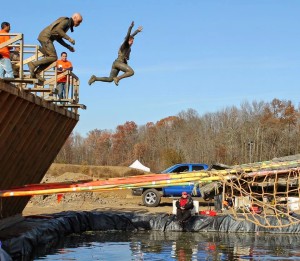
DF – At what point did you decide that you would take on the challenge and brutality of Muay Thai as well as the incredible endurance challenge of competing in the 24 Hour Tough Mudder events?
HC –I was looking for something different from what I had known all my life. When my college career ended I needed something to train for, so I started a cardio kickboxing class and the instructor approached me about competing in Muay Thai. Since I was always a team sport athlete, this was completely different. I had to rely on only myself to win the battle. I guess in hindsight I was kind of approaching soccer like that anyway. I love the huge amount of pressure that an individual sport put on me, I thrive under pressure, it’s when I am at my best. I also knew that I didn’t have to rely on anyone but myself for the win, and I liked that because I knew I controlled the outcome and I was confident I could get the job done. It is the same for World’s Toughest Mudder, I was done being a “team” athlete and I wanted to push myself individually to see how far I could go.
DF – What mental skills did you learn playing collegiate soccer that helped you to know you would be able to handle those extreme sports?
HC – I learned how to control my emotions, to stay calm during rough times, to be self-motivated, to let my mind dictate my body.
DF – What specific role did mental toughness play in Muay Thai fighting for you?
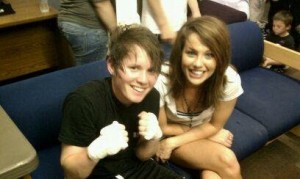
HC– In any kind of sport where someone is trying to kick your head off your shoulders, you have to be mentally strong enough to even stand in the ring. You also have to be confident in your preparation and training that lead up to the event, including mental training. Mental toughness played probably the biggest role in this sport for me because you are going to get hit and it’s going to hurt, but can you keep going. I love the phrase ‘mental grit’, it symbolizes how much you are willing to take to get what you want. I was determined to not lose even if that meant getting rocked a couple times, I wasn’t going to be the one that got TKOed. At the end of the match my hand was going to be raised, because I was mentally tough enough to withstand anything my opponent threw at me. This is what I visualized before every training session. And this is how I always visualized myself. “It will be my hand that the ref raises.”
DF – So let’s talk a bit more specifically about being a Muay Thai fighter. When did you find yourself using your positive self-talk skills in Muay Thai?
HC –During training mostly when I was tired and worn down in the last couple rounds of sparring, I would remind myself that this is what it took to win. Even though my legs were shaking and my arms felt like they were going to fall off, I had to keep going because I wasn’t going to be the one to give up. Simple phrases like “push harder”, “move”, “this is your fight”, “hands up”, really helped get me through some hard days.
DF – As a Muay Thai fighter who never lost, tell us how you stayed strong towards the latter part of each round.
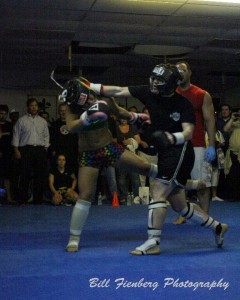
HC – The last minute of each round is critical, you and your opponent are tired, worn down and most likely hurting in some way. Sometimes all you have is your mental game. It would come down to who was more mentally tough, who could focus on their strengths, and who could push through that mental barrier of fatigue and pain to pull off a couple more combos to make sure you won that round. Sure that sounds like a physical barrier, but remember your mind controls your body. Even when I felt like I couldn’t lift my arms or move my feet, my mental toughness was going to allow me to hit and move. I would just come back to that vision of it being me who would have her arm raised. That was just how the match would end because I would make it so.
DF – In the last few years you have taken up the sport of Tough Mudder, another incredibly brutal sport. What part, specifically in your Tough Mudder races, does a maintaining a positive attitude help you the most?
HC – When you are on mile 20 and still have 2 more miles, 4+ obstacles to go and your body is throbbing, maintaining a positive attitude is all you have. As soon as you let yourself think that you have nothing left and you can’t possibly go another mile, you are done. If you can maintain a positive attitude in that situation you will get through, your body will stop throbbing and your feet will keep moving.
DF – Other than maintaining a positive attitude, how else do you incorporate mental training into your Tough Mudder events? Especially the 24-hour variety?
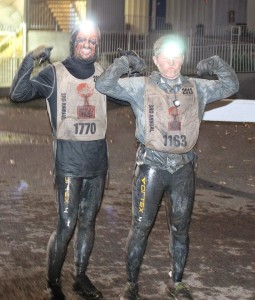
HC –The 24 hour even is a different animal all in itself. You are completely self-sufficient from the food you bring to the gear you wear. At the end of the day if you are not mentally strong, it will eat you alive. You can train as hard and as much as you want for this event, you can be a physical specimen, but if you don’t have that mental grit, you are finished before you start. Last year when I did this event for the first time, I had no idea what 24 hours really felt like. So I set the goal of just being consistent. My game plan was to keep moving, even if it was a slow jog or fast walk. I kept telling myself ‘at minimal, you can walk the course and complete the obstacles if need be.’ I never let the fear of my body shutting down creep into my head. I had a solid game plan and I stuck to it. Maintaining concentration on the task at hand was huge. Dealing with emotions and anxiety was also huge. If I could control my emotions and concentrate on each obstacle that came my way and mile one at a time, then I knew I would be fine. And I was. I used a lot of self-talk during that 24 hours!
DF – There certainly are times in all three of your sports that you must have found your concentration wavering. Can you tell me how you were able to bring yourself back to the moment and stay effective?
HC – There have been times in each sport that I have been down or worn out and tired. My pride and determination always brings me back. There is no use in giving in to those feeling of doubt and negativity, it gets you nowhere and you feel terrible later. Just rely on the hours of training and do one thing at a time.
DF – Of the three sports you competed, in or still compete in, what mental skills have you continued to use even to this day?
HC – Maintaining a positive attitude (which is a life lesson/goal), self-motivation, self-talk, managing emotions (I am a very emotional person on both ends of the spectrum, this one is huge for me) and maintaining concentration.
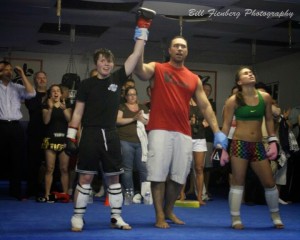 DF – As a strength and conditioning specialist, what types of things do you find yourself talking to your clients about so they too can hopefully learn how to increase their mental toughness?
DF – As a strength and conditioning specialist, what types of things do you find yourself talking to your clients about so they too can hopefully learn how to increase their mental toughness?
HC – Something I tell my athletes now is, you control your work rate; at the bare minimum you can still sprint for a ball, complete that last rep, etc. If your mind tells you that you can, your body will follow. The pain from training and games that most athletes encounter on a day to day basis is totally temporary. You may not be the most skilled player, or the fastest; being the most mentally tough will help you win battles you didn’t think you could. People will show you who they truly are in their last reps. The mentally tough will grind it out, push to get that last rep even when their bodies are shaking, or finish that last sprint as hard as they can even though they may puke. That’s how athletes get a little better each day. It never comes down to the competition, it comes down to winning the battle with yourself.
Derrek Falor. M.Ed.
derrek@thrivesp.com
www.thrivesp.com
@derrekfalor
Derrek is the owner of Thrive: Excellence in Sport Performance, has coached college soccer for the past 20 years, has a USSF A License, is a member of the Association for Applied Sport Psychology, is undergoing professional certification through AASP, and has a Master’s Degree in Sport Psychology.
- Getting Your Intensity Level Right - March 17, 2025
- Building a Functional Resilience Plan is Vital to a Referee’s Success - February 18, 2025
- sport in a pandemic: Crisis or opportunity?Chapter 4 - December 4, 2020

